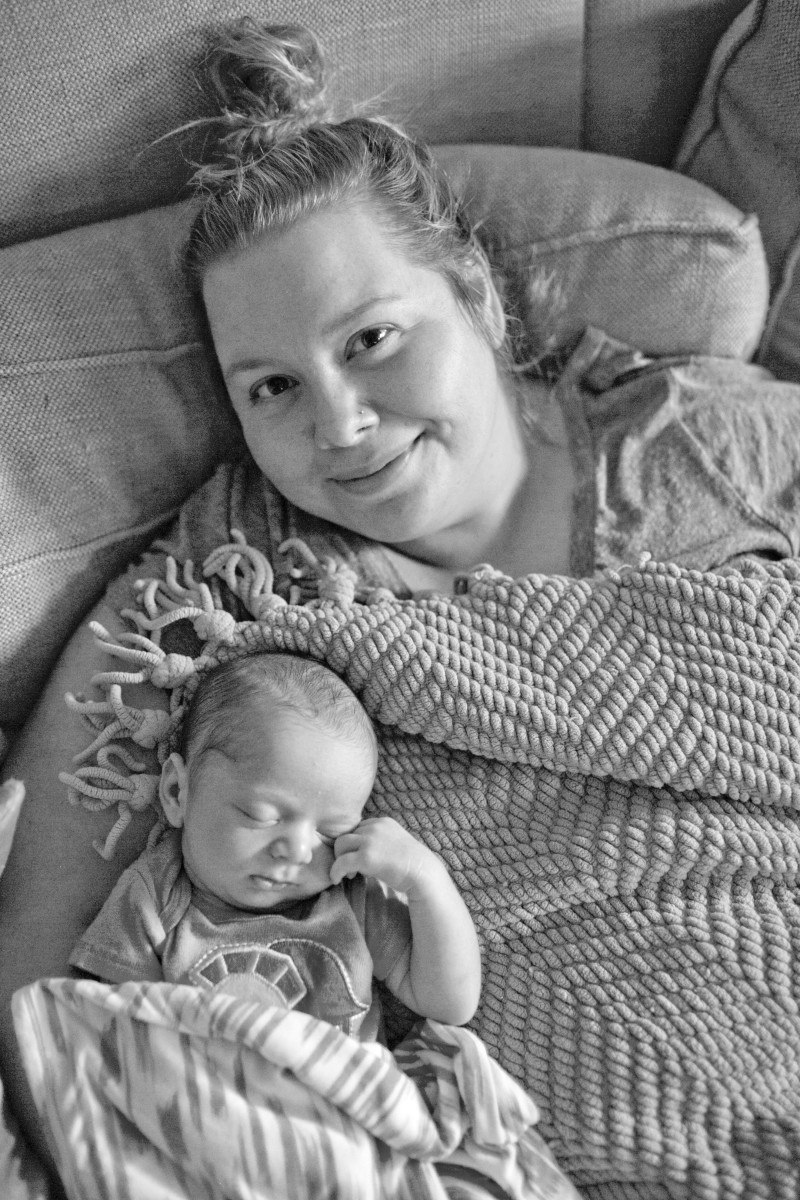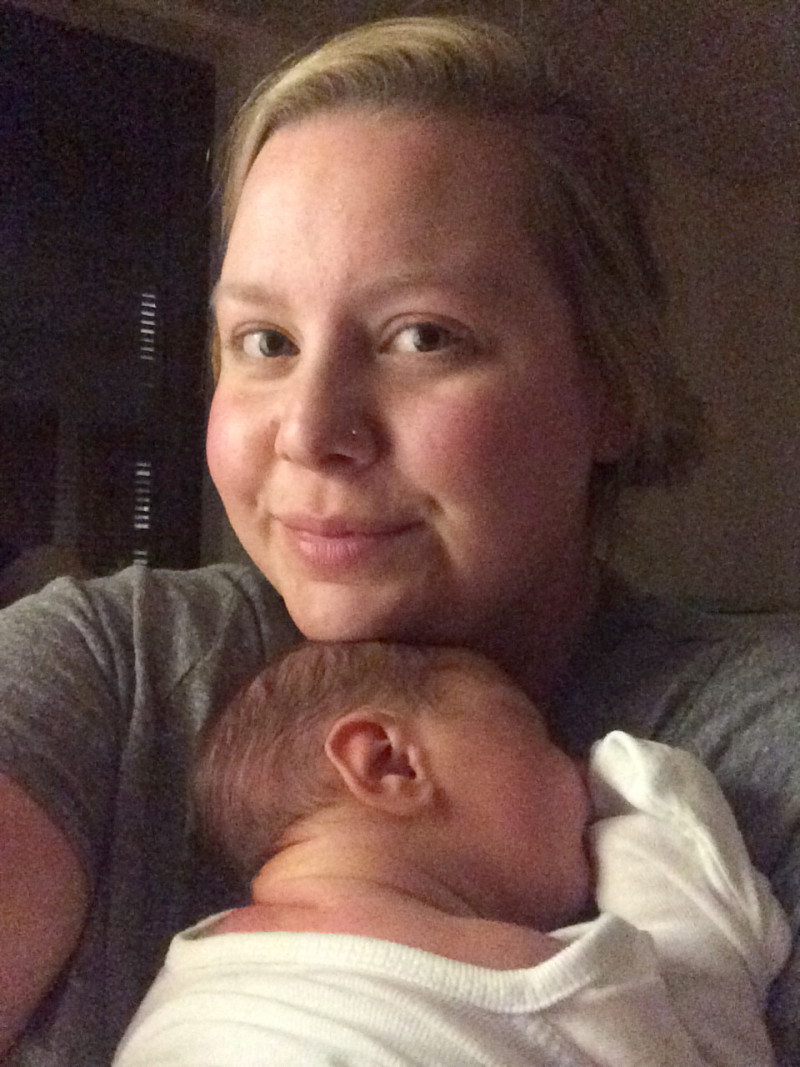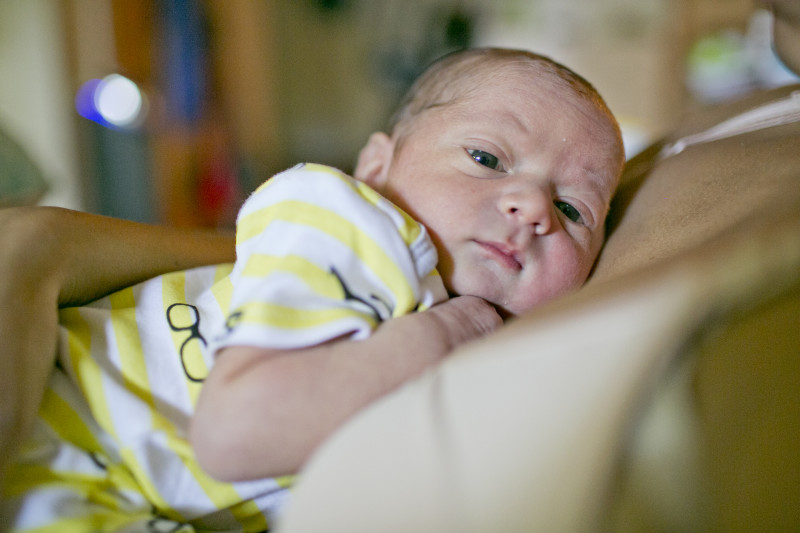Remember seeking the attention and affection of your first love? How absolutely mad you were with obsession? How much you wanted them to want you, too?
Well, that’s nothing compared to how desperately you’ll want your baby to love and need you.
When we found out Sona was pregnant, we were, of course, thrilled. I didn’t want to carry our baby, anyway, and I didn’t really experience any pregnancy FOMO.
That said, the one thing that did eat at me a little was the question of whether or not I would have the same immediate love for Finn that Sona had. Her emotional response was largely biological, I thought. Her body would practically force her to fall head-first for our son.
From what I read, it seemed like everything a new mom did while carrying or caring for their newborn lead to the release of oxytocin. Feel the baby kick? Oxytocin! Breastfeed? Oxytocin! Think about your baby? Oxytocin! Look into those beaming baby eyes? Oxytocin!
Even mice pick up on these instinctual cues:
“To understand the role oxytocin plays in a mother mouse’s brain, scientists at New York University School of Medicine first investigated how female mice in general respond to the distress calls of baby mice. Pups emit ultrasonic cries when they are separated from the nest, which sometimes happens when a mother carries her babies to a new location. (Moms change nest locations regularly to elude predators.) When a mother hears these cries, she runs to the lost pup, picks it up, and carries it back to her nest. Other scientists have shown that moms respond even to the distress cries of pups that aren’t their own, readily approaching loudspeakers that broadcast the calls. Most virgin female mice, though, couldn’t care less; they seem completely indifferent to the pups’ cries for help. And yet, some virgin females that have either been housed with a mother and her litter or have been injected with oxytocin will retrieve crying infants.
That discovery led the team’s leader, neuroscientist Robert Froemke, to suspect that oxytocin must help ‘transform the virgin brain into the maternal.’”
Being a biological mother, it seemed, was practically like tossing back a Dixie cup full of happy pills! (You know, aside from the raging hormones and emotional volatility you experience after birth.)
So, when Sona seemed positively smitten with our son before he even formed limbs, I got a little worried.
Don’t get me wrong, it’s not that I didn’t love him as soon as we found out about him. It’s just that I think it was more of a head-centered love than a gut-centered love, if that makes sense. I mean, I knew I would love him, and I loved the idea of him, but I didn’t go wobbly in the knees.
Sona sensed this, too, I think. When I wouldn’t respond the way she expected to a kick or an ultrasound photo, she would say, “I don’t know if you care about him!” That sounds worse than she meant it. What I think she meant was, “Why don’t you love him as much as I do? Aren’t you crazy, madly, head-over-the-heels in love with this to-be baby?!”
She was worried that I wasn’t growing attached to our to-be son quickly enough, and I was worried that she and Finn would have some kind of biologically-driven love-bond that I wouldn’t be able to experience.
During the pregnancy, I fixated a lot on what the moments immediately after he was born would be like, actually. Too many narratives, and too many movies, had led me to believe that there should be an instantaneous, all-encompassing, bigger-than-life love for your baby, starting from the first second you set eyes on his cheese-covered body.
What if I, as the non-biological mother, didn’t experience that? What if my body–or my heart–didn’t respond the way it would have if I had contributed my own DNA?
The weird thing is, my preoccupation wasn’t really about Finn. I knew that, no matter what, he’d feel loved. It was about me. I was worried that I would be missing out on the euphoric surge of goodness that comes with seeing your child for the first time.
And here’s the truth: there wasn’t an immediate love-bond. Don’t get me wrong, Finn came out a little blue and floppy, and I’ve never willed something to wellness as much as I did, standing over the table as the newborn nurse flicked his feet and rubbed his back. He was immediately my son, and I immediately wanted everything in the world for him.
But I wouldn’t say that, in that first day, after experiencing 24 hours of sleepless, exhausting labor with Sona, I was in love with him. And, funny enough, Sona now admits the same.
We were both so tired and delirious that, in that first day, we weren’t able to process much else.
I remember, running out that evening to drive family around and grab some dinner for Sona and myself, thinking, “Should I be feeling differently?” Was I some kind of soulless monster because I didn’t feel immediately and overwhelmingly attached to our son?
Then, in the wee hours of the second night at this hospital, it happened. Finn had just finished breastfeeding, and Sona passed him off to me so that I could soothe him while she drifted off to sleep.
I remember it now as vividly as I experienced it then. I put him on my chest, and he curled up into a little ball, much like he still likes to do. (What can I say? I’m a round, soft gal. I make for a good pillow.)
He wedged his head under my chin, twisted his face to the side so much that it scared me, and settled in.
And that was it; that was the moment I fell in love with my son.
Maybe a flood of oxytocin hit me, too. Or maybe it didn’t really matter, because he was (is) mine, and my heart knew it, even if my body didn’t. (Though, as it turns out, adoptive parents experience the rise in oxytocin levels, too. So, in truth, our bodies don’t care. We love our babies because they are ours and not because we birthed them.)
I guess it would be more accurate to say that that was the first time I fell in love with Finn. There was also the time, a day or two after we came home, that I sobbed while rocking him to sleep in the middle of the night.
Or every time he looks at me like this.
Or gives me stink eye. Or puckers his lips while sleeping. Or does anything, really.
Yet, that first time was when I just knew. What did I know? I’m not even sure I can tell you. But Sona knows it too, now. And most parents come to know it in their own time, I’m sure.
We can carry the fear of not knowing whether or not our babies will love us–or we will love them (like I did). And we can carry the shame of feeling like we didn’t love them soon enough or in the right way or like it was expected, too. None of it does anyone any good, in the end.
But I’m here to tell you: it will happen when it happens–and likely when you’re least experiencing it. And when it does, just hold on. Cause DNA or no DNA, you ain’t never known a love like this.



“But I’m here to tell you: it will happen when it happens–and likely when you’re least experiencing it. And when it does, just hold on. Cause DNA or no DNA, you ain’t never known a love like this.”
Ain’t that the truth.
I didn’t feel the immediate knock-down, drag out love at B’s birth either–but it hit me, it really did. I can’t say when, but it came in its endless, boundless, limitless way.
The first lines of your post remind me of Dr. Gordon Neufeld’s work, specifically his book Hold On To Your Kids. He discusses the way we engage in courtship behavior with our children, and how that behavior helps us to “hold on” to them (and them to us) when they are faced with the prospect of peer orientation. A dynamite read.
I’ve seen so many moms shame themselves for not feeling the love-bond immediately. (I’ve seen moms shame themselves about A LOT of things, actually.)
I’ll definitely check out that book. Thanks, Lori! And thanks for your comments. 🙂